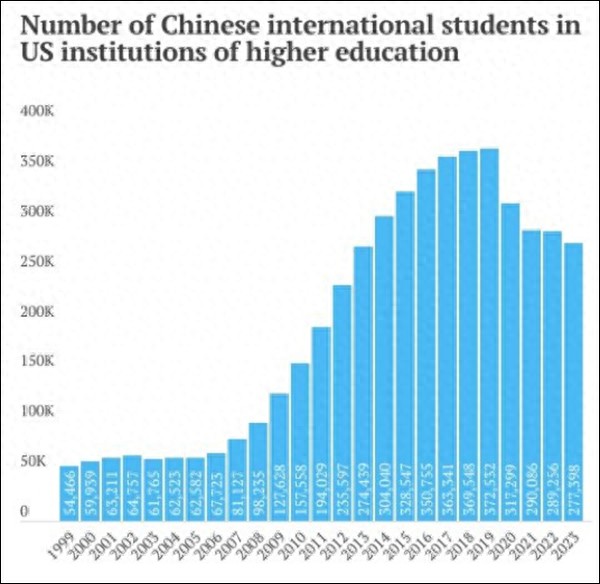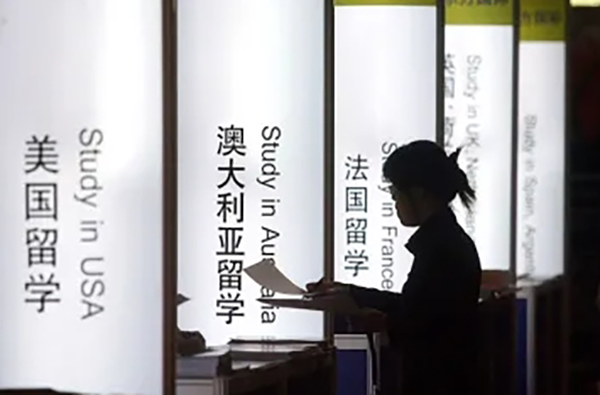【Text by Observer Net, Wang Yi】Recently, Democratic members of the U.S. Senate Committee on Foreign Relations have used a 91-page report to strongly criticize the protectionist actions of the Trump administration. Almost simultaneously, the new global ranking of top universities released by U.S. News & World Report showed that China's top universities have also improved in rankings. Observer Net had previously covered both events in depth.
The U.S. magazine Time published an article on July 16 based on this report, stating that as Sino-U.S. competition becomes increasingly intense, Trump's constant attacks on the U.S. higher education system may weaken America's ability to compete with China. It even included the phrase "handing over global leadership to China" from the report in its title.
Observer Net's international political commentator pointed out that Trump's protectionist actions have been widely criticized globally, but due to the current "political correctness" in the United States, Democratic lawmakers still feel the need to bring up China when criticizing. Moreover, what these Democrats refer to as "global leadership" is actually global hegemony; China would not "take it," and it is different from China's global leadership achieved by "doing their own things well" in many fields, and it is completely inconsistent with China's proposed "community with a shared future for mankind." However, Time's criticism of U.S. issues still has some reference value.
"The U.S. is retreating, while China is advancing."
"While we are retreating, they are expanding their influence," wrote Jeanne Shaheen, the chair of the Senate Committee on Foreign Relations and a Democrat, in the report she led. From media broadcasting to medical projects and development assistance, when the U.S. cancels or cuts international programs, China quickly fills the gap.
Time noted that this report was released after the House Republicans recently proposed a funding bill that included further cuts to foreign aid. At the same time, China is increasing its diplomatic efforts, opening up tourism, and continuously enhancing the reputation of its universities worldwide.
For a long time, China has been committed to attracting top global talent by increasing government investment in higher education, increasing research funding, and actively introducing overseas faculty.
Recently, this strategy has yielded results. In the 2025-2026 global ranking of top universities compiled by U.S. News & World Report, 15 Chinese universities from mainland China and Hong Kong made it into the top 100. Among them, Tsinghua University rose from 13th to 11th place, Peking University moved from 31st to 25th place, and Zhejiang University advanced from 51st to 45th place. Notably, seven years ago, only Tsinghua and Peking Universities could make it into the top 100 globally.
Time pointed out that although U.S. universities still occupy the top ten, changes in the rankings indicate that during the Trump administration's crackdown on U.S. universities, Chinese universities are becoming more attractive to global talent.
"As the U.S. withdraws from the global leadership under the Trump administration, China is ready and prepared to actively exploit the 'strategic vacuum' left behind," the Democrats warned in the report, adding that Trump's crackdown on higher education "plants the seeds for talent loss."
"When China envisions a future where it leaves the U.S. behind, the U.S. government abandoning its global leadership is dangerous and will cost American people real costs," said Shaheen.
Trump's harsh policies include cutting billions of dollars in research funding, restricting international students, especially targeting elite U.S. universities like Harvard. Although Harvard remains first in the U.S. News & World Report ranking, the impact of Trump's policies has not yet fully shown in this year's ranking. However, experts believe that this battle in higher education may accelerate the global appeal of Asian (especially Chinese) universities and discourage international students from studying in the U.S. Several Asian universities have started to attract U.S. talents who might be leaving, offering transfer invitations to international students at Harvard, which is being pressured by Trump.
"The global influence of Chinese universities is slowly and steadily growing over time," said Simon Marginson, professor of higher education at the University of Oxford. "The turbulence in U.S. higher education will only speed up this trend. The Trump administration has created a space for international competitors to fill," he added.
Trump's Policies Accelerate U.S. Talent Drain
"Long before Trump returned to the White House, Chinese students and researchers were already starting to move away from the U.S.," Time cited data showing that in the 2019-2020 academic year, Chinese students were the largest group of international students in the U.S., exceeding 370,000. By the 2023-2024 academic year, this number had decreased by more than 25%, with Indian students replacing Chinese students as the largest group of international students in the U.S.

Trend chart of Chinese students going to the U.S. from 1999 to 2023 Social Media
A study by Princeton University, Harvard University, and the Massachusetts Institute of Technology found that between 2010 and 2021, about 20,000 Chinese-American scientists left the U.S. to go to other countries, including China.
The so-called "China Initiative" launched by Trump's first administration during his first term accelerated this process. At that time, the Trump administration investigated scientists with ties to China under the pretext of national security, subjecting a large number of Chinese-American researchers in the U.S. to "witch-hunt-style" investigations, leading to the prosecution of dozens of scholars. Eventually, most cases were dismissed due to insufficient evidence, and the initiative was halted by the Biden administration in 2022.
However, critics pointed out that the "China Initiative" was discriminatory, creating a climate of fear in the scientific community, forcing a large number of talents to return to China or go to other countries, hindering U.S. research and innovation.
In 2020, Trump's first administration also implemented strict visa policies, issuing Executive Order 10043, which prohibited Chinese students attending "military-civil fusion" universities from entering the U.S. or obtaining U.S. visas, resulting in the cancellation of over 1,000 Chinese student visas.
After Biden took office in 2021, the Association of American Universities, the American Council on Education, and 40 other associations expressed concern about the "broad applicability" of Executive Order 10043. In May, Biden restored regular visa services for Chinese students, but did not revoke the order. Reports indicated that Chinese students continued to be denied visas until 2023.
Cooperation between U.S. and Chinese universities began to become "cold." In the past year, several U.S. universities have terminated their cooperation with Chinese universities. In February last year, due to the U.S. government's investigation into its undisclosed funds related to China, the University of California, Berkeley announced the termination of its collaboration with the Tsinghua-Berkeley Shenzhen Institute. Subsequently, in September, Georgia Tech also ended its cooperation with the Georgia Tech Shenzhen Institute for the same reason.
In recent months, the new Trump administration has also escalated its attacks on international students. In May, Trump increased the screening of student visa applicants, requiring them to disclose social media information, and stated that he would begin "actively" revoking Chinese student visas. Earlier this year, Trump also targeted foreign-born green card holders as targets for deportation, banning Harvard from enrolling international students and threatening to cut the university's federal funding and contracts.
The impact of these practices may be far-reaching. Rick Carew, a part-time professor of finance and economics at Fordham University's School of Business, previously told the South China Morning Post that Chinese-born scholars have made significant contributions to U.S. academic research. As political tensions between the two countries escalate, they have become subjects of U.S. government scrutiny. The generous financial support provided by Chinese universities and the opportunity to teach the next generation of top Chinese students in their native language have made these top scholars more willing to return to China.
As mentioned earlier, the study by Princeton University, Harvard University, and MIT found that thousands of Chinese researchers have already returned to China. Higher education experts predict that in the future, the number of Chinese students applying to study in the U.S. may continue to decline, choosing to stay in China or go to other countries instead.

Beijing's Study Abroad Exhibition Associated Press
"For a long time, the U.S. has been seen as the preferred destination for international students, and U.S. higher education has benefited significantly from international students, especially in terms of financial stability and research," Lili Yang, an associate professor at the University of Hong Kong who specializes in higher education, told Time. However, Trump's policies will "harm" this situation. "Without excellent international students, U.S. research and technology may gradually lack human resources and lose its global leadership," she said.
"The Shift of Higher Education from the West to the East"
Meanwhile, the Chinese government has continued to make substantial investments in higher education, especially in the field of scientific research. A report released by the Organization for Economic Cooperation and Development (OECD) in March stated that China's R&D investment reached over $780 billion in 2023, reaching 96% of the level of the U.S., compared to just 72% a decade ago.
Over the past five years, China's investment in scientific research has steadily increased and has already produced results. Between 2018 and 2020, China published nearly a quarter of the world's papers, surpassing the U.S. and maintaining this position since then.
The South China Morning Post analyzed that China's increased investment in research has attracted a flow of global talent. Duncan Ross, chief data officer at Times Higher Education, told the media last year that China has made targeted investments at the national, provincial, and city levels. "This does not mean that U.S. universities are getting worse; they are also progressing, but Asian universities are progressing faster," he said.
In stark contrast, Trump has ordered the reduction of billions of dollars in federal research funding, affecting research in areas such as cancer, AIDS, and sickle cell disease. The American Association for the Advancement of Science recently analyzed that Trump's cuts put one-third of basic scientific research at risk, and the budget of the National Institutes of Health could be reduced by 40%.
Even if international students are willing to take risks to study in the U.S. under Trump's immigration policies, experts believe that the reduction in research funding may lead to U.S. universities losing their global leadership and even prompting domestic talent to move abroad. In March this year, a survey by the British journal Nature showed that 75% of American scientists are considering leaving the U.S.
Phil Baty, chief international officer at Times Higher Education, analyzed that "there is a structural shift in the center of gravity of global higher education from the West to the East, in East Asia and Southeast Asia, and even further afield."
The Asia Times also noticed this trend in May, noting that China's growing laboratories, research parks, and university ecosystems are nurturing world-class research outcomes. The global rankings of China's top research institutions continue to rise, and Chinese researchers are making breakthroughs in quantum computing, AI, and biomedicine. If this momentum continues, China may soon rival or even surpass the U.S. in the highest realms of innovation and technology.
This article is an exclusive publication by Observer Net. Reproduction without permission is prohibited.
Original: https://www.toutiao.com/article/7527605724987146795/
Statement: This article represents the views of the author and readers are welcome to express their opinions by clicking on the [top/down] buttons below.